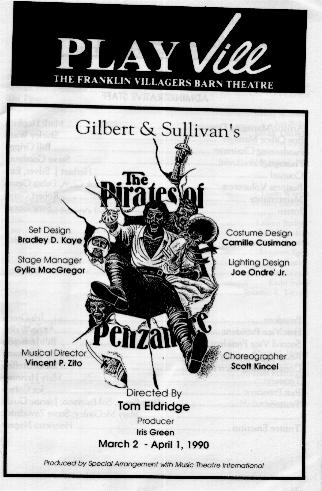Month: May 2007
Moon Over Buffalo
|
|
Sept 17 – Oct 3, 2004A Farce by KEN LUDWIGDirected by LINDA GIORDANO
|
|
Charlotte and George Hay, an acting couple not exactly the Lunts are on tour in Buffalo in 1953 with a repertory consisting of Cyrano de Bergerac“revised, one nostril version” and Noel Coward’s Private Lives. This backstage farce by the author of Lend Me a Tenor brought Carol Burnett back to Broadway co-starring with Philip Bosco as her megalomanic, drunken husband and leading man. Fate has given these thespians one more shot at starring roles in The Scarlet Pimpernel epic and director Frank Capra himself is en route to Buffalo to catch their matinee performance. Will Charlotte appear or run off with their agent? Will George be sober enough to emote? Will Capra see Cyrano, Private Lives or a disturbing mixture of the two? Hilarious misunderstandings pile on madcap misadventures, in this valentine to Theatre Hams everywhere. |
|
A Winnie-the-Pooh Christmas Tail
Disney’s Mulan
Oct 17 – 25, 2009
|
||
|
Travel back to the legendary, story-telling days of ancient China with this action-packed stage adaptation of Disney’s Mulan. The Huns have invaded, and it is up to the misfit Mulan and her mischievous sidekick Mushu to save the Emperor! Mulan Jr. is a heartwarming celebration of culture, honor and a fighting spirit. The score includes favorites likes “Reflection,” “Honor to Us All” and “I’ll Make a Man Out of You”, as well as new songs to get your on your feet!
|
||
The Pirates of Penzance
Music by Arthur Sullivan Book by WS Gilbert Directed by Tom Eldridge The Pirates of Penzance tells the story of a young pirate apprentice named Frederic who has come to the end of his indentured period. As it turns out, Frederic was indentured by mistake. His half-deaf nurse had been instructed to apprentice him … Read more
The Still Alarm. The Stronger. No Exit
Volpone
The Man in the Dog Suit
| Logo |
The Man in the Dog Suitby Albert Beich and William H Wright |
| Oliver is being groomed by his in-laws for a position in the family business: banking. Shy and ineffectual under ordinary circumstances, Oliver discovers that he can be bold and independent when wearing the dog costume he had acquired for a masquerade ball. Donning it on the proper occasions, he can even outface his in-laws. They, in turn, are appalled at the thought of Oliver’s wearing the dog suit in public. When he wears it to work at the bank he’s told he must choose between the dog suit and his job. To his delight, he discovers that his wife is as bored with their stuffy life as he is, and they suddenly decide to head for the great woods of Oregon, where Oliver can pursue his dream of being a tree surgeon. The in-laws are shocked, except for one: As Oliver leaves, his brother-in-law takes over the dog suit, and another hilarious rebellion is apparently on its way. | |
A Phoenix Too Frequent
| Logo |
A Phoenix Too Frequentby Christopher Fry |
| In this version of the famous Matron of Ephesus, we have a fresh retelling of the story of a pious widow—and her maid—who mourns for the death of her recently deceased husband in the tomb where his bier lies awaiting internment. The maid is not quite so pious, yet both women begin to suffer the pangs of a self-imposed hunger. There are signs that they also are unhappy over the loss of male company, but not until a handsome guard appears does the widow begin regretting her noble experiment in withdrawing from the world. The guard is invited to keep the ladies company, and he in turn invites them to partake of his food. Before long the widow is ready to forget her pious devotions and shows indications of returning speedily to a worldly and pleasant life which she had too soon decided to give up. | |

